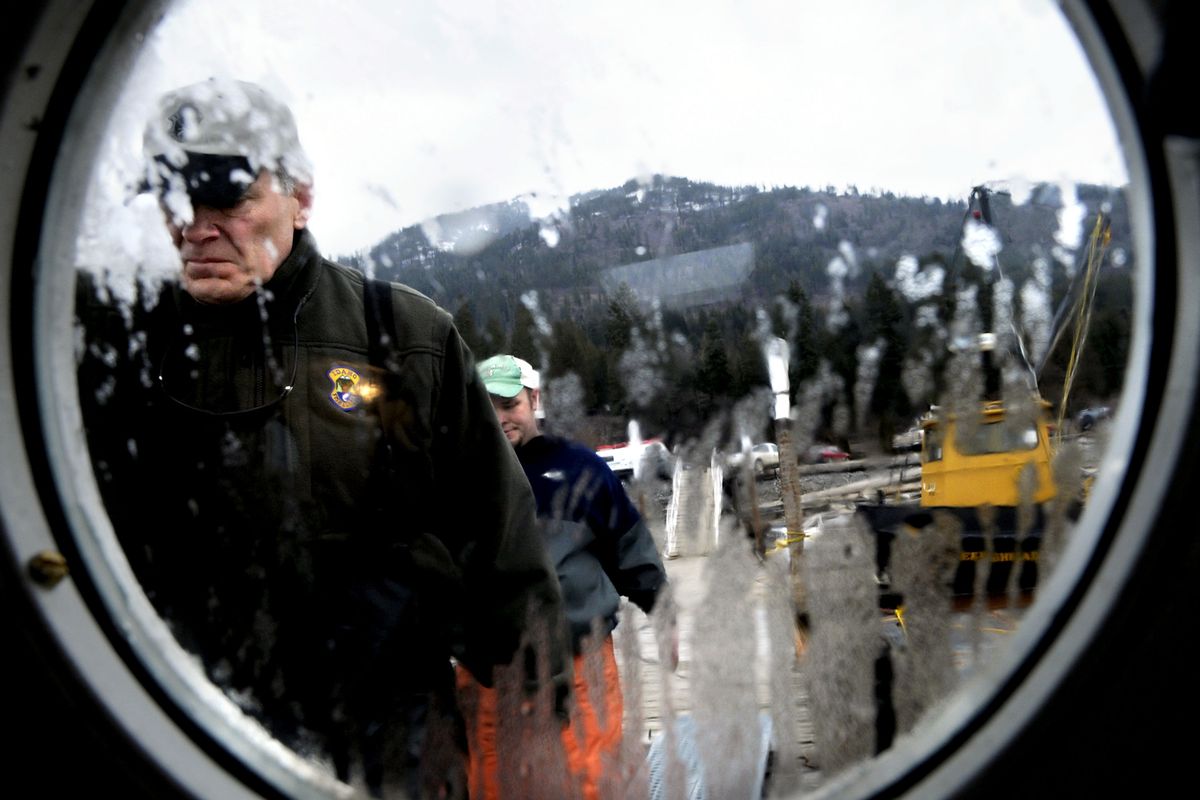Unwanted trout
Wisconsin company culling Lake Pend Oreille mackinaw

HOPE, Idaho – Working shoulder-to-shoulder aboard a commercial gillnetter, Paul Saunders and his crew plucked fish from a 900-foot net, deftly untangling snared gills and thrashing tails from the mesh.
The morning’s take: 200 pink-fleshed mackinaw.
Saunders spent decades fishing on the Great Lakes before his employer – Hickey Brothers Fishery of Bailey Harbor, Wis. – was recruited by the Idaho Department of Fish and Game to help cull non-native mackinaw from Lake Pend Oreille.
Last year, the crews harvested 17,000 of the invasive fish, which are disrupting the lake’s food chain. This year, Hickey Brothers has a $460,000 contract with Fish and Game to continue the gill-netting. The money comes from the Bonneville Power Administration and Avista Corp. as mitigation for destruction of fish habitat from hydropower operations.
Mackinaw are also known as lake trout. Since they’re native to the Great Lakes, local fisheries managers looked to the Midwest for expert fishermen.
“There are hundreds of people who can gill-net salmon in coastal-type operations, but this deep-water gill-net fishery is pretty specialized,” said Jim Fredericks, IDFG’s regional fishery manager.
Earlier this week, the crew fished upper Lake Pend Oreille, setting four to five miles of nets each day. Saunders, a bearded man who speaks in the Scandinavian-tinged accent of the upper Midwest, told stories about squalls on Lake Michigan as he piloted the boat across the lake. In contrast, Lake Pend Oreille was mirror-smooth, reflecting images of the Cabinet Mountains. A flock of hopeful seagulls and a few eagles followed the 35-foot-long gillnetter, snatching up an occasional fish.
“You can’t beat the scenery,” said Saunders, who sometimes spots mountain goats at the water’s edge.
Each day’s catch gets packed on ice and taken to local food banks, where it’s given out to needy families.
By targeting mackinaw, Idaho Fish and Game hopes to restore balance to the lake.
Mackinaw were introduced to Lake Pend Oreille in 1925. Their populations ballooned in the 1990s, after mysis shrimp were added to the lake. On a shrimp diet, young mackinaw survival rates shot up. The species became bullies of the ecosystem, gobbling up endangered bull trout and kokanee – a landlocked salmon that once formed the basis for a multimillion-dollar sport fishery in Lake Pend Oreille.
While kokanee aren’t native to the lake, they’re a beneficial presence, said Andy Dux, a Fish and Game research biologist. Their oil-rich flesh feeds a variety of other animals, from grizzly bears and otters to adult bull trout and Kamloops rainbow trout.
Last year, survival rates hit 70 percent for 1- to 2-year-old kokanee, the age the fish are typically eaten by mackinaw. Two years ago, those survival rates were at 10 percent, said Dux, the research biologist.
He credits the gill-netting operation for better kokanee survival, along with an Avista-funded program that pays anglers $15 for each mackinaw they catch.
The crew on Hickey Brothers’ gillnetter will spend the next four months on upper Lake Pend Oreille, setting nets in 250-foot-deep waters to target young mackinaw. In late summer, the crews will return again to target adult lake trout in spawning grounds.
In between, the boat will be hauled on a trailer to Lake Michigan, where Hickey Brothers has run a commercial fishing operation for three generations, said Dennis Hickey, part-owner of the company. Hickey Brothers also contracts with the National Park Service for a mackinaw culling operation at Yellowstone.
The gillnetter is a long, boxy boat that rides low in the water. Inside, a mechanical crank turned swiftly on Tuesday, hauling the nets up from the lake’s bottom. Country music blared from the radio as the men sorted fish.
The need for gill-netting on Lake Pend Oreille will fade as mackinaw numbers decrease, fisheries managers said.
“Hopefully, they’ll fish themselves out of business,” said Fish and Game’s Fredericks.